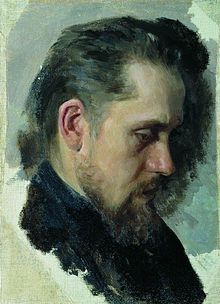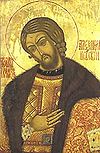- Nikolay Pomyalovsky
-
Nikolay Pomyalovsky 
Portrait of Pomyalovsky by Nikolay Nevrev 1860Born April 23, 1835
St. Petersburg, RussiaDied October 17, 1863 (aged 28)
St. Petersburg, RussiaPeriod 1850s-1860s Genres Fiction Notable work(s) Seminary Sketches Signature 
Nikolay Gerasimovich Pomyalovsky (Russian: Никола́й Гера́симович Помяло́вский), (23 April [O.S. 11 April] 1835 – 17 October [O.S. 5 October] 1863), was a Russian writer.
Contents
Early life
Pomyalovsky was born in St. Petersburg in 1835. His father was a deacon in the Orthodox Church in Malaya Okhta, a village on the bank of the Neva River, across from St. Petersburg. Pomyalovsky studied at the Alexander Nevsky Theological School (1843–51), where his lifelong problem with alcoholism began, and at the St. Petersburg Theological Seminary (1851–1857).[1] His work Seminary Sketches is a harrowing description of his years in these schools.[2]
Career
Upon leaving the seminary, he earned a living by serving at funerals, singing in choirs, and giving private lessons. His story Vukol was published in the Journal for Education in 1859. In 1860 he started teaching at the largest of St. Petersburg's Sunday schools, which were staffed by volunteers, and designed to educate the children of the working class. He had high expectations for the usefulness and influence of the Sunday schools, but when these expectations went unrealized he turned to drinking again.[1]
He published his first novel Bourgeois Happiness in Sovremennik (The Contemporary). He also became friends with the editor of Sovremennik, Nikolay Nekrasov, and with its guiding spirit Nikolay Chernyshevsky. As a result of this success, he attended many parties, and drank heavily, which eventually landed him in the hospital with delirium tremens. His novel Molotov (1861) secured his reputation, and brought him into the company of writers like Ivan Turgenev and Fyodor Dostoyevsky.[1]
Last Years
He had hoped to find solidarity and fellowship in the St. Petersburg literary circles, but found only backbiting, petty ambitions, and what he saw as condescension from the established gentry writers. He rebelled by getting drunk often and acting in a way that alienated his friends and literary connections. At a dinner party held by Dostoyevsky, he ended up passed out drunk on the floor. He began disappearing for weeks at a time, living in the St. Petersburg slums among prostitutes and criminals, and continuing to feed his addiction to alcohol. His binges usually led to his being jailed or hospitalized. During this time he worked on his Seminary Sketches, the first of which was published in Dostoyevsky's journal Vremya (Time). He attempted suicide several times, and spent the winter of 1862-63 in the hospital. In 1863 he moved to the country with his brother and two student acquaintances in an effort to break with his habits and find sobriety. Another binge, brought on by misunderstandings that broke up his living arrangement, nearly killed him. A few days into his recovery he noticed a sore on his leg. When doctors opened the sore, they found gangrene, which he soon died from.[1]
Pomyalovsky had a considerable influence on Maxim Gorky and others, and is ranked high among Russian realist writers.[1]
Notes
Sources
Bibliography
- Очерки бурсы: Seminary Sketches, New York: Cornell University Press, 1973
- Мещанское счастье: Bourgeois Happiness
- Молотов: Molotov
- Брат и сестра: Brother and Sister (unfinished)
- Поречане: People from Porechye (unfinished)
Further reading
- "Pomyalovsky", an article from the Encyclopedia of Literature, Moscow (1929—1939) (Russian)
Links
People from Russia Leaders and religious - Pre-1168
- 1168–1917
- 1922–1991
- 1991–present
- RSFSR leaders
- General secretaries
- Soviet premiers (1st deputies)
- Soviet heads of state (and their spouses)
- Prime ministers (1st deputies)
- Foreign ministers
- Prosecutors general
- Metropolitans and patriarchs
- Saints

Military and explorers - Field marshals
- Soviet marshals
- Admirals
- Aviators
- Cosmonauts
Scientists and inventors - Aerospace engineers
- Astronomers and astrophysicists
- Biologists
- Chemists
- Earth scientists
- Electrical engineers
- IT developers
- Linguists and philologists
- Mathematicians
- Naval engineers
- Physicians and psychologists
- Physicists
- Weaponry makers
Artists and writers Sportspeople - Chess players
Categories:- Russian short story writers
- 1835 births
- 1863 deaths
- Russian novelists
- Russian educators
- People from Saint Petersburg
- Deaths from gangrene
Wikimedia Foundation. 2010.

